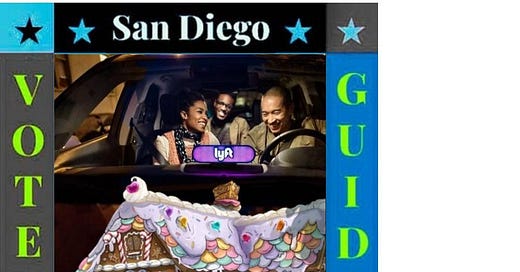CA Proposition 30: A Poison Pill Wrapped in Sweet Promises
You could call it a “privatization of the budgetary process.”
In order to understand why California’s Proposition 30 is a bad idea, you need to grasp an understanding of the fallacies of the tech economy. First, let’s look at the obvious things in play here, which are all reasons why something like this measure is attractive.
Legislative Language: Clean Cars and Clean Act
Yes on 30 / Clean Air CA
Website / Facebook/ Twitter/ Instagram
Media: Yes on California Proposition 30: This measure would boost air quality, fire preparedness
No on Prop 30
Website / Facebook/ Twitter
Media: No on California Proposition 30: This measure is one company’s special interest carve-out
An initiative seeking to impose a tax on higher incomes to finance the conversion of the transportation sector of the economy away from fossil fuels seems like a good idea.
We have a serious health problem. Vehicular traffic in California accounts for roughly 50% of our greenhouse gas emissions, nearly 80%of nitrogen oxide pollution, and 90% of diesel particulate matter pollution.
Research by the American Lung Association shows localities throughout the region with failing grades for air quality despite stronger emissions standards and cleaner vehicles being on the road. We’re killing ourselves in both the short and long term.
The planet, despite all the happy talk from the advocates of incremental change, is headed for serious trouble, and the Golden State needs to be a leader in bringing a needed economic transformation and reordering of priorities needed to fend off the disastrous effects of climate change.
The pollution/climate change part of this proposal is self-evident. But there’s an underside, one where we’re being hustled to offset the failures of an illusionary approach to modern day commerce.
Understanding why Lyft –the only major donor– is willing to cough up $25+ million and shepherd Prop 30 through the electoral process is key to seeing the grift going on here.
Prop 30 includes a poison pill allowing those revenues to evade a California constitutional guarantee about a portion of state income taxes funding public education.
It’s an insidious precedent, one with the potential to create funding streams diverting money away from schools along with programs like health care, social services, and public safety. You could call it a “privatization of the budgetary process.”
The measure came about because, in 2021, the California Air Resources Board passed a rule requiring Lyft, Uber, and other rideshare companies to use zero-emission vehicles to drive at least 90% of their miles by 2030. There is no way Lyft in particular will be able to afford such a conversion, which would involve financing all their “independent contractor” drivers with new vehicles.
Rideshare companies arose based on the premise that their labor costs would disappear with the advent of autonomous driving technologies. AI-run passenger vehicles have flopped big time and the horizon for adoption of such technologies keeps moving farther away.
Ride-share companies made a huge gamble, one that involved purposely losing money on every transaction over a period of time in a quest to build market share, preferably a monopoly. After all, such a strategy worked for Amazon (See: California antitrust case) and the various platforms through which most internet traffic passes.
The arguments against Prop 30 include some fluff, especially the one about a “massive tax hike” on Californians. A 1.75% personal income tax increase on residents making more than $2 million per year to fund a suite of climate programs is only massive in the minds of people who are allergic to paying taxes in the first place.
Having warned readers about the downsides of Prop 30, there are some promised benefits, which explains why a lot of organizational names you know and trust are backing the measure.
From CalMatters:
The proposition creates a new revenue stream to subsidize zero-emission vehicles and fund wildfire response and prevention — between $3.5 billion to $5 billion annually, growing over time, according to state analysts.
Most of the money — about 80% — would go towards rebates for people buying zero-emission cars and to build more charging stations. Half of that funding will go to low- and middle-income residents, who are disproportionately affected by poor air quality and heavy pollution. The state already spends millions each year on zero-emission vehicle programs and dedicated an additional $10 billion over the next five years to those programs in this year’s budget.
A quarter of the tax money would provide funding to hire and train firefighters, who are battling increasingly worsening wildfires. On average, the state spends about $2 billion to $4 billion annually putting out wildfires.
All these promises sound so sweet. Except they’re sweet like the house made of gingerbread, cake and candy in the German fairy tale Hansel & Gretel.
Say no to Prop 30. It’s a cynical ploy to get us to pay for a corporation's infrastructure.
Next up: Proposition 31 – First, We Shoot the Tobacco Companies Lawyers
Previous voter guides:
(More coming soon)
California State Officials
California’s DC Delegation
State Senate Races
State Assembly Races
SD County Supervisors
County Sheriff, Assessor, and Treasurer Races
SD Measure B: Cash Meets Trash
SD Measure C: Reach for the Sky! Or Else?
SD Measure D: Righting a Wrong to Build a Future
SD Measure H: It’s for the Children (And Their Parents)
CA Proposition One: It’s About More Than Abortion
CA Propositions 26 & 27: Betcha Can’t Pick Just One
CA Proposition 28: Arts & Music for a Sane Future
CA Proposition 29: Regulating Dialysis Clinics and the Definition of Insanity
***
Boards of Education Contests:
Analysis by Thomas Ultican
2022 School Board Contests, Part 1
The County Board, San Diego Unified, Sweetwater Union, Poway Unified
2022 School Board Contests, Part 2
Chula Vista, San Marcos, Vista, Grossmont
2022 School Board Contests, Part 3
Oceanside, Escondido, San Dieguito
2022 School Board Contests, Part 4
Coronado, Carlsbad, Escondido Union
***
Email me at WritetoDougPorter@Gmail.com




